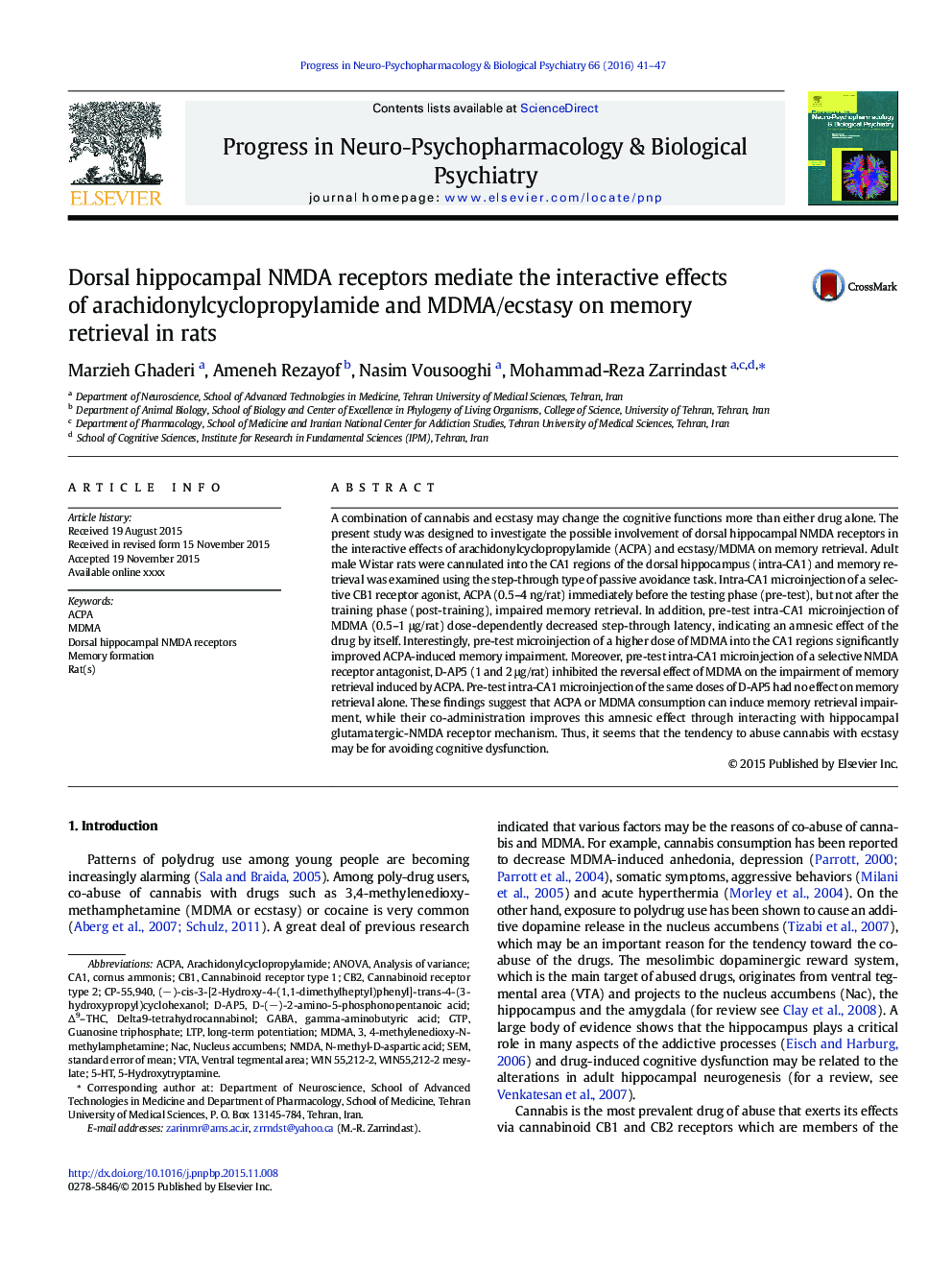| کد مقاله | کد نشریه | سال انتشار | مقاله انگلیسی | نسخه تمام متن |
|---|---|---|---|---|
| 5844245 | 1561028 | 2016 | 7 صفحه PDF | دانلود رایگان |
عنوان انگلیسی مقاله ISI
Dorsal hippocampal NMDA receptors mediate the interactive effects of arachidonylcyclopropylamide and MDMA/ecstasy on memory retrieval in rats
دانلود مقاله + سفارش ترجمه
دانلود مقاله ISI انگلیسی
رایگان برای ایرانیان
کلمات کلیدی
delta9-tetrahydrocannabinol5-HTCP-55,940GTPCA1NACACPAN-methyl-d-aspartic acidMDMA5-hydroxytryptamineCB2VTACB1NMDA(−)-cis-3-[2-hydroxy-4-(1,1-dimethylheptyl)phenyl]-trans-4-(3-hydroxypropyl)cyclohexanol - (-) - سیس-3- [2-هیدروکسی-4- (1،1-دی متیل هپتییل) فنیل] -ترون-4- (3-هیدروکسی پروپیل) سیکلو هکسانولD-(−)-2-amino-5-phosphonopentanoic acid - D - (-) - 2-amino-5-phosphonopentanoic acidd-AP5 - D-AP5WIN 55,212-2 - WIN 55،212-2gamma-aminobutyric acid - اسید گاما آمینو بوتیریکanalysis of variance - تحلیل واریانسANOVA - تحلیل واریانس Analysis of variancelong-term potentiation - تقویت درازمدتLTP - تقویت طولانی مدت یا LTP standard error of mean - خطای استاندارد میانگینrat(s) - رت (ها)memory formation - شکل گیری حافظهSEM - مدل معادلات ساختاری / میکروسکوپ الکترونی روبشیventral tegmental area - ناحیه تگمنتوم شکمیcannabinoid receptor type 1 - نوع گیرنده کانابینوئید 1Nucleus accumbens - هسته accumbenscornus ammonis - کورنو AmmonisGABA - گاباGuanosine triphosphate - گوانوزین تری فسفاتcannabinoid receptor type 2 - گیرنده کانابینوئید نوع 2
موضوعات مرتبط
علوم زیستی و بیوفناوری
علم عصب شناسی
روانپزشکی بیولوژیکی
پیش نمایش صفحه اول مقاله

چکیده انگلیسی
A combination of cannabis and ecstasy may change the cognitive functions more than either drug alone. The present study was designed to investigate the possible involvement of dorsal hippocampal NMDA receptors in the interactive effects of arachidonylcyclopropylamide (ACPA) and ecstasy/MDMA on memory retrieval. Adult male Wistar rats were cannulated into the CA1 regions of the dorsal hippocampus (intra-CA1) and memory retrieval was examined using the step-through type of passive avoidance task. Intra-CA1 microinjection of a selective CB1 receptor agonist, ACPA (0.5-4 ng/rat) immediately before the testing phase (pre-test), but not after the training phase (post-training), impaired memory retrieval. In addition, pre-test intra-CA1 microinjection of MDMA (0.5-1 μg/rat) dose-dependently decreased step-through latency, indicating an amnesic effect of the drug by itself. Interestingly, pre-test microinjection of a higher dose of MDMA into the CA1 regions significantly improved ACPA-induced memory impairment. Moreover, pre-test intra-CA1 microinjection of a selective NMDA receptor antagonist, D-AP5 (1 and 2 μg/rat) inhibited the reversal effect of MDMA on the impairment of memory retrieval induced by ACPA. Pre-test intra-CA1 microinjection of the same doses of D-AP5 had no effect on memory retrieval alone. These findings suggest that ACPA or MDMA consumption can induce memory retrieval impairment, while their co-administration improves this amnesic effect through interacting with hippocampal glutamatergic-NMDA receptor mechanism. Thus, it seems that the tendency to abuse cannabis with ecstasy may be for avoiding cognitive dysfunction.
ناشر
Database: Elsevier - ScienceDirect (ساینس دایرکت)
Journal: Progress in Neuro-Psychopharmacology and Biological Psychiatry - Volume 66, 3 April 2016, Pages 41-47
Journal: Progress in Neuro-Psychopharmacology and Biological Psychiatry - Volume 66, 3 April 2016, Pages 41-47
نویسندگان
Marzieh Ghaderi, Ameneh Rezayof, Nasim Vousooghi, Mohammad-Reza Zarrindast,